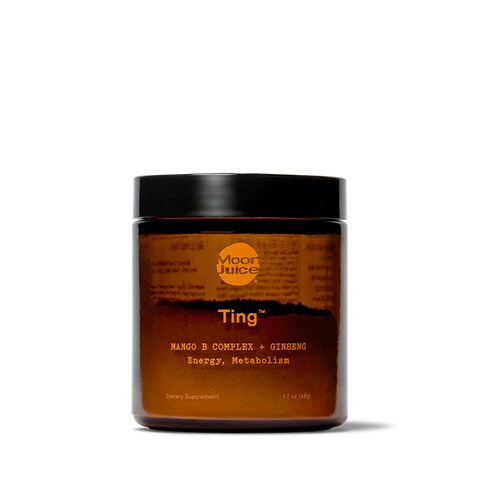Did you know that every cell in the human body requires Magnesium to function properly? How about the fact that nearly half of people in the United States don’t get enough of the mineral on a daily basis?
Enter: Magnesium supplements, which can step in to reach your daily requirements with greater ease. The many benefits of magnesium can range from supporting heart health and regulating blood sugar to supporting digestive and gut health. However, there are many different types of Magnesium to choose from — and the best form for you will depend on your primary goals and concerns. (Spoiler alert: some of the best supplements include a blend of Magnesium forms to yield several benefits at once, such as magnesium for relaxation, a better night’s sleep, and digestive relief.)
Keep reading to learn more about different kinds of Magnesium so you can figure out which one is best for you to take.
Why Do We Need Magnesium?
Again, this mineral is essential for cellular integrity and function. Among its many duties, adequate Magnesium levels are tied to:
- Better sleep — including a shorter time falling asleep and longer sleep duration — by encouraging relaxation and helping to regulate circadian rhythms.
-
Magnesium brain health benefits including enhanced neuroplasticity, improvements in cognitive performance, and protection against cognitive decline
- Less stress and a better mood by regulating the sympathetic nervous system (aka your “fight or flight” response) and the parasympathetic nervous system (aka your “rest and digest” response)
- Healthy digestive function and regularity by easing intestinal muscles and speeding up digestion
It’s theoretically possible to reach your recommended dietary allowance (RDA) through Magnesium-rich foods alone. Yet a variety of factors — including soil depletion, inadequate intake of said foods, and issues around bioavailability — make this a challenging feat for most. Moreover, a growing body of research shows that stress can deplete our Magnesium levels… and that low Magnesium levels, in turn, can exacerbate symptoms of stress.
Supplementing with Magnesium is a tried and true way to ensure you’re getting enough of this crucial mineral on a consistent basis. But to make progress not only on your overall Magnesium status but also on specific wellness concerns, it helps to know more about the different types of Magnesium available and which one(s) best suit your needs.
How Many Types of Magnesium Are There?
Ahead, we’re covering 9 different types of Magnesium supplements and their key benefits.
1. Magnesium Citrate
Composed of Magnesium salt and Citric Acid, this variety is one of the most popular and effective forms of Magnesium available. It’s among the most bioavailable types of Magnesium (which means that it can more easily be absorbed via digestion, then circulated in your bloodstream, to best achieve its intended effects). Since it travels quickly and efficiently throughout the body, Magnesium Citrate is great for those seeking to replenish low levels of the mineral.
Regularity is another major benefit of Magnesium Citrate. Magnesium makes you poop by drawing water to your stool, making it softer and easier to pass. It can also increase the frequency of your bowel movements. Given its natural and mild laxative effect, this type of Magnesium is helpful for people who deal with occasional constipation and digestive irregularity.
2. Magnesium Glycinate
Composed of Magnesium salt and Glycine (an amino acid), Magnesium Glycinate is another common form of the mineral, given its bioavailability and digestive tolerability. On its own, Glycine has been shown to enhance sleep quality, support neurological function, and promote overall well-being.
One study of mature adults who took Magnesium Glycinate found that adequate intake could help optimize 25-hydroxyvitamin D status. Since Vitamin D deficiency is common not only in the United States but worldwide, Magnesium, in general, may help promote higher levels of the much-needed sunshine vitamin.
Magnesium Glycinate may also be helpful in promoting relaxation and thus mitigate the effects of stress, insomnia, and low mood. Taking this type of magnesium before bed can support better sleep. However, more studies are needed to support these claims with certainty. For more information about how this type of magnesium differs from Magnesium Citrate, explore our comparison guide of Magnesium Glycinate vs. Citrate.
3. Magnesium Gluconate
Magnesium Gluconate is one more highly bioavailable form of Magnesium, making it a good option for anyone seeking to boost their overall intake of the mineral. It’s lauded for its ability to support muscle relaxation. This form is also unlikely to cause loose stools and trigger other manifestations of digestive distress. Since long-term GI issues can lead to low blood Magnesium levels, Magnesium Gluconate may be a preferred form for those who routinely experience diarrhea — all the while supporting healthy and normal digestive function.
4. Magnesium Chloride
This type of Magnesium includes Chlorine to create a salt. Small studies show that it’s well-absorbed in the digestive tract and is thus one of the more bioavailable types of Magnesium. Similar to the forms discussed above, it is also a good option to generally boost Magnesium status.
Magnesium Chloride is available via oral supplements, as well as in topical forms such as ointments and lotions. Research shows that transdermal Magnesium Chloride may be helpful in managing soreness and pain, but evidence linking them to improvements in Magnesium status is scarce.
5. Magnesium Lactate
This kind of Magnesium — which includes the mineral plus Lactic Acid — is less common as a standard dietary supplement than the ones we’ve already covered. Instead, it’s most regularly used as a food additive to regulate acidity. Magnesium Lactate is also known to be among the more easily digestible forms, even when taken in higher quantities.
In fact, one 2017 study investigated participants with a rare genetic medical condition associated with severe Magnesium deficiency (who require very high doses of the mineral). Researchers found that patients who ingested Magnesium Lactate reported favorable outcomes for digestive ease than the control group. With that said, this form of Magnesium may be ideal for those with certain health issues — including long-term digestive upset and other conditions that lead to significant Magnesium loss.
6. Magnesium Malate
Magnesium Malate is a combination of Magnesium and Malic Acid, the latter of which is naturally found in some fruits and wine. It’s yet another form of Magnesium prized for its bioavailability and adequate absorption in the digestive tract.
On the topic of digestion, Magnesium Malate is unique in that it has less of a laxative effect than other types of Magnesium. For this reason, it could be a worthy option for people who want to increase their Magnesium levels without a heightened digestive response.
Research also shows that high doses of Magnesium Malate may help reduce tenderness in people with certain long-term health conditions that include pain as a major symptom. However, higher-quality studies are needed to support such benefits more conclusively.
7. Magnesium Acetyl Taurinate
This bioavailable type includes Magnesium and a form of Taurine, an amino acid. In a 2020 study, animals with baseline low Magnesium levels that ingested this form of Magnesium showed significantly heightened activity of receptors involved in synaptic plasticity in the hippocampus region of the brain.
The hippocampus plays a major role in learning and memory — yet it’s vulnerable and susceptible to damage from stimuli, as well as affected by neurological and psychiatric conditions. In short, Magnesium Acetyl Taurinate shows promise to not only boost low Magnesium levels but also support cognitive function and mood.
Additionally, Magnesium Taurate has been shown to reduce blood pressure, supporting heart health.
8. Magnesium Sulfate
Magnesium Sulfate consists of Magnesium, Sulfate, and Oxygen. It’s more commonly known as Epsom salt: the same kind that people enjoy adding to a bath to unwind, soothe soreness, and relieve tension. (You can also choose to consume it orally, though most people find it unpalatable. It’s more commonly used in hospital settings in this regard, as it’s FDA-approved for certain medical conditions requiring clinical care — but also for constipation.)
While Epsom salt baths — as well as other topical solutions, such as sprays and lotions — remain popular to destress and relax muscles, the scientific community is less enthusiastic about the merits of transdermal Magnesium supplementation. Per a 2017 review of studies in the journal Nutrients, transdermal use is a “scientifically not yet proven form of Magnesium application” despite its potential “to get into the lymphatic system beneath the dermis and enter the circulatory system, bypassing the regulation through the GI tract and hereby increasing serum Magnesium.”
All things considered, the authors of the review prize “proven and well-documented oral magnesium supplementation” over transdermal forms.
9. Magnesium Oxide
Magnesium Oxide is a combination of Magnesium and Oxygen to form a powder. Though common, Magnesium Oxide might not be ideal if you’re looking to replenish low levels. That’s because it has lower absorption than other forms of Magnesium we’ve covered on this list.
For instance, one randomized, double‐blind, placebo‐controlled study found that participants who supplemented with Magnesium Oxide over 60 days showed no differences in Magnesium concentration compared to a placebo group. Meanwhile, those who supplemented with Magnesium Citrate showed superior Magnesium concentration, courtesy of its higher bioavailability.
Despite these findings, Magnesium Oxide may still offer certain benefits in higher doses. A 2021 randomized controlled trial found that 500 milligrams of Magnesium Oxide can help alleviate pain in those with recurrent bouts of migraine. It is also used as an antacid — which yields benefits for those who deal with heartburn — as well as to help alleviate constipation and indigestion.

What Type of Magnesium Should I Take?
While most of us stand to benefit from boosting our Magnesium intake in general, you can get more granular to hone in on specific needs.
When it comes to choosing the right magnesium supplement, it's important to know which concern you're trying to target. Here’s a quick recap of the different types of Magnesium you may wish to prioritize based on your concerns:
- Most bioavailable and best to boost Magnesium Status: Magnesium Citrate, Magnesium Glycinate, Magnesium Gluconate, Magnesium Chloride, Magnesium Malate
- Best for digestive function and regularity: Magnesium Citrate, Magnesium Gluconate, Magnesium Lactate, Magnesium Oxide
- Best for pain relief and management: Magnesium Malate, Magnesium Oxide
- Best for cognitive function: Magnesium Acetyl Taurinate
Chelated Magnesium
As we hinted at earlier, some Magnesium supplements include a blend of different forms of the mineral so you can promote well-being on several fronts with a single product. For instance, Magnesi-Om® packs three bioavailable forms of Magnesium in a Chelate blend:
- Magnesium Gluconate supports muscle relaxation*
- Magnesium Acetyl Taurinate promotes cognitive function and mood*
- Magnesium Citrate helps with regular bowel movements*
This blend also includes L-Theanine, a nootropic amino acid, to enhance benefits for your mind and mood. L-theanine promotes alpha-wave brain activity to boost alertness and mental clarity, all the while promoting a sense of calm and healthy cognitive aging.*
A high-quality, multiform chelated Magnesium supplement like Magnesi-Om® is a worthy addition in the wellness toolkits of those seeking support while dealing with:
- Low Magnesium levels
- Headaches
- Brain fog
- Fatigue
- Insomnia
- Stress
- Constipation
- Digestive irregularity
- Physical, mental, and emotional symptoms related to PMS
Rest assured that Magnesi-Om® is safe and gentle enough to take on a daily basis, without being stimulating or habit-forming. For best results, mix 1 teaspoon of the all-natural Magnesium powder in water as part of a calming nightly routine (or whenever you need some extra support to destress).
Curious how long Magnesium Citrate takes to work? You should begin to feel more relaxed within a few hours of intake. If you’re backed up, expect greater digestive relief within a day or two. Brain health benefits from Magnesium take a bit longer to manifest (and require consistency), but remember that good things are worth the wait.
Sources
- https://lpi.oregonstate.edu/mic/micronutrient-inadequacies/overview
- https://pubmed.ncbi.nlm.nih.gov/35184264/
- https://pubmed.ncbi.nlm.nih.gov/27933574/
- https://www.ncbi.nlm.nih.gov/pmc/articles/PMC7761127/
- https://pubmed.ncbi.nlm.nih.gov/32162607/
- https://medlineplus.gov/druginfo/meds/a619019.html
- https://pubmed.ncbi.nlm.nih.gov/28337245/
- https://www.researchgate.net/publication/349288354_Increased_serum_vitamin_D_concentration_under_oral_magnesium_therapy_in_elderly_hypertensives
- https://medlineplus.gov/druginfo/meds/a601072.html
- https://ods.od.nih.gov/factsheets/Magnesium-HealthProfessional
- https://www.sciencedirect.com/science/article/abs/pii/S2095496415601959?via%3Dihub
- https://world.openfoodfacts.org/additive/e329-magnesium-lactate
- https://www.ncbi.nlm.nih.gov/pmc/articles/PMC5837242/
- https://pubmed.ncbi.nlm.nih.gov/29679349/
- https://www.ncbi.nlm.nih.gov/pmc/articles/PMC8371721/
- https://pubmed.ncbi.nlm.nih.gov/33593714/
- https://www.ncbi.nlm.nih.gov/pmc/articles/PMC3548359/
- https://www.ncbi.nlm.nih.gov/books/NBK554553/
- https://www.ncbi.nlm.nih.gov/pmc/articles/PMC5579607/
- https://www.jle.com/fr/revues/mrh/e-docs/mg_citrate_found_more_bioavailable_than_other_mg_preparations_in_a_randomised_doubleblind_study__260858/article.phtml?cle_doc=0003FAFA
- https://pubmed.ncbi.nlm.nih.gov/30798472/
- https://jphcs.biomedcentral.com/articles/10.1186/s40780-019-0133-7

.png?v=1689810009229)











